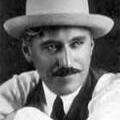 Mack Sennett was an innovator of slapstick comedy in film. During his lifetime, he was known as "the King of Comedy." Born Michael Sinnott in Danville, Quebec, in 1880, Sennett was a son of Irish immigrants. His father was a blacksmith in the small Eastern Townships village.
Mack Sennett was an innovator of slapstick comedy in film. During his lifetime, he was known as "the King of Comedy." Born Michael Sinnott in Danville, Quebec, in 1880, Sennett was a son of Irish immigrants. His father was a blacksmith in the small Eastern Townships village.
Sennett became a singer, dancer, clown, actor, set designer and director for Biograph, and founded Keystone Studios in 1912 together with Adam Kessel. Many important actors were discovered by him and started their career at Keystone. Those include Charlie Chaplin, Raymond Griffith, Gloria Swanson, Ford Sterling, the Keystone Kops and many more.
Sennett first acted in films at Biograph Studios, playing low comedy parts, usually oafish rural types. His chance at directing came in 1912 at the new Keystone brand. His fast-paced knockabout style and good distribution as part of the Mutual program, insured recognition of the Keystone trade mark as well as his stars and his own name. In a very short space of time, that name became synonymous with screen comedy. In fact, when he left to produce independently, to be released by Paramount in 1917, he didn't fight to take the Keystone Brand with him, his own name proved more valuable.
Into the 1920s, his short subjects were in great demand, with stars such as Billy Bevan, Harry Gribbon, Vernon Dent, Alice Day, Ralph Graves, Charley Murray, and Harry Langdon. He produced several features with his brightest stars such as Ben Turpin and Mabel Normand.
In an ultimately poor business move in the mid 1920s, he moved over to Pathé distributors, which although had a huge exchange, made bad decisions, such as handling too many comedies at once, including Sennett's main competitor, Hal Roach. In 1927, Hollywood's two top studios, Paramount and MGM, seeing the profits coming in from short-subject companies like Pathé and Educational, both got back into their own distribution and production after several years. Roach signed up with MGM, leaving Sennett now by himself at Pathé, but they were now on hard times because the hundreds of exhibitors that used to take their shorts had switched to the new MGM or Paramount subjects.
In 1928, Sennett bought property in the San Fernando Valley on Ventura Boulevard in Studio City, founding his 38 acre (154,000 m²) Keystone Studios.
Sennett occasionally experimented with color and was the first to get a talkie short subject on the market in 1928. Less than successful films such as "Hypnotized" with blackface comedians Mack and Moran were done in the early 1930s near the end of his career when he sold his backlog of films to Warner Brothers. As moviegoers' tastes changed, Warner used it for occasional stock footage and eventually destroyed them when they took up too much space. Today many Sennett films, especially from his most productive and creative period no longer exist.
In sum, Sennett's style made our great grandfathers laugh, but he was loath to ever change his formula of chases and messy fights. It was very nearly the same from his first to his last, aimed at the less demanding in the audience. Today his name is still highly recognizable, even to those who will have virtually no contact with his films, and the term "Keystone Kops" has become part of the language to describe incompetent buffoons with some supposed authority.
He died in Woodland Hills, California, in 1960, and was interred in the Holy Cross Cemetery in Culver City, California.